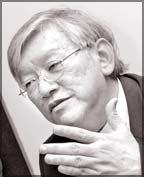Developing nations should unite for a better world
Wijitha NAKKAWITA
Executive Director of South Centre, Geneva, a news and advocacy
organization for a better world economic order Martin Khor stepped into
Lake House on his short visit to Colombo on Tuesday. He was able to
express his views and experiences both as an editor and a person who had
worked towards bringing together the print media in the developing
countries.
|

Martin Khor |
In the context of globalization and the present international
economic order the developing nations had to unite to achieve equity for
their development efforts. In today's world national decisions are
influenced by certain international actions and therefore the developing
nations should unite to speak in one voice.
In this effort the media of developing countries had to play an
important role in helping the exchange of news and views, he observed.
In his informal conversation about his experience and that of his
country Malaysia he said the newly independent nations of the world
especially those in Asia had to face a common question immediately after
independence - their economies continued to be under the transnational
or foreign corporate giants and the indigenous population or the
governments could not achieve economic independence.
In the case of Malaysia its main economic resources were rubber and
tin industries but here again the emphasis was on exporting these as raw
material without value addition.
Seventy percent of the country's banking and financial sector was in
the hands of two foreign banks thus the local people had no share in the
economy's vital transactions, he observed.
However Malaysia rich in natural resources began a new chapter of its
economy with the policies introduced by one of its leaders who wished to
change the economic scenario as had happened in many developing
countries after they regained their independence.
Some nations in the 1960s resorted to nationalization but the
Malaysian Premier decided to buy the shares of the transnational
corporations and the banks. He also adopted the policy of fixing the
value of the Malaysian currency without allowing it to float to the
amazement of the economists and the Central Bank but his strategy worked
and Malaysian economy recorded growth and stability.
Instead of producing raw rubber as done earlier rubber sheets or
other value added products were manufactured by the local private sector
and soon other sectors too followed the example, Khor explained.
His talk reminded one of the efforts made by the governments of our
country especially in the era prior to 1977 when leaders like Madame
Sirimavo Bandaranaike of the United Front Government was able to unite
the Non-Aligned nations on many issues like keeping the Indian Ocean
zone free of military interference from nuclear powers.
The economic policy of self sufficiency then followed by us and
neighbouring India was also among the efforts of the then developing
nations to be free from intervention.
Khor said different countries had adopted different methods to
achieve economic independence but it was most essential that the
developing countries came together on issues like sustainable patterns
of growth to prevent global warming and allow the developing countries
to derive their share from their economic effort as the World Trade
Organization policies and those of the international lending agencies
like the IMF were heavily tilted towards the developed countries in the
world where as the larger number of people lived in developing
countries.
He said he had a very high respect for the internationally acclaimed
Sri Lankan economist Dr. Gamini Corea and his main emphasis was that
developing countries like ours should become strong in their views by
uniting with other such countries to enable an equitable development to
take place while taking measures to prevent damage to the environment
that could cause more harm than benefit.
|



